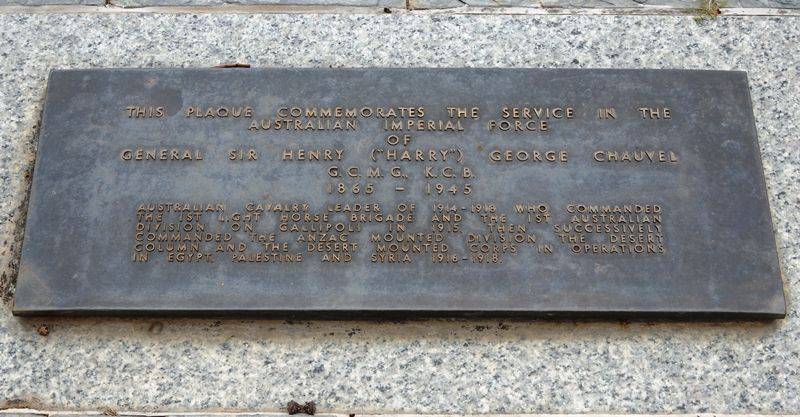
Sir Harry ChauvelPrint Page 

The plaque commemorates the service of Sir Henry ("Harry") Chauvel (1865 - 1945), a senior officer of the Australian Imperial Force (A.I.F.), who fought at Gallipoli and in the Middle East Theatre in World War One.
As commander of the Desert Mounted Corps he was responsible for one of the most decisive victories and fastest pursuits in military history. At Beersheba in October 1917, his light horse captured the town and its vital water supply in one of history's last great cavalry charges.
By September 1918, Chauvel was able to effect a secret redeployment of three of his mounted divisions and launch a surprise attack on the enemy that won the Battle of Megiddo, which he followed up this victory with one of the fastest pursuits in military history.
Location
| Address: | ANZAC Parade, Desert Mounted Corps Memorial, Reid, 2612 |
|---|---|
| State: | ACT |
| Area: | AUS |
| GPS Coordinates: | Lat: -35.287535 Long: 149.142274 Note: GPS Coordinates are approximate. |
Details
| Monument Type: | Plaque |
|---|---|
| Monument Theme: | People |
| Sub-Theme: | Military |
| Link: | http://adb.anu.edu.au/ |
Dedication
This plaque commemorates the service in the Australian Imperial Force of General Sir Henry ("Harry") George Chauvel G.C.M.G., K.C.B.
1865 - 1945
Australian Cavalry leader of 1914 - 1918 who commanded the 1st Light Horse Brigade and the 1st Australian Division on Gallipoli In 1915.
Then successively commanded the ANZAC Mounted Division, the Desert Column and the Desert Mounted Corps in operations in Egypt, Palestine and Syria
1916 - 1918



